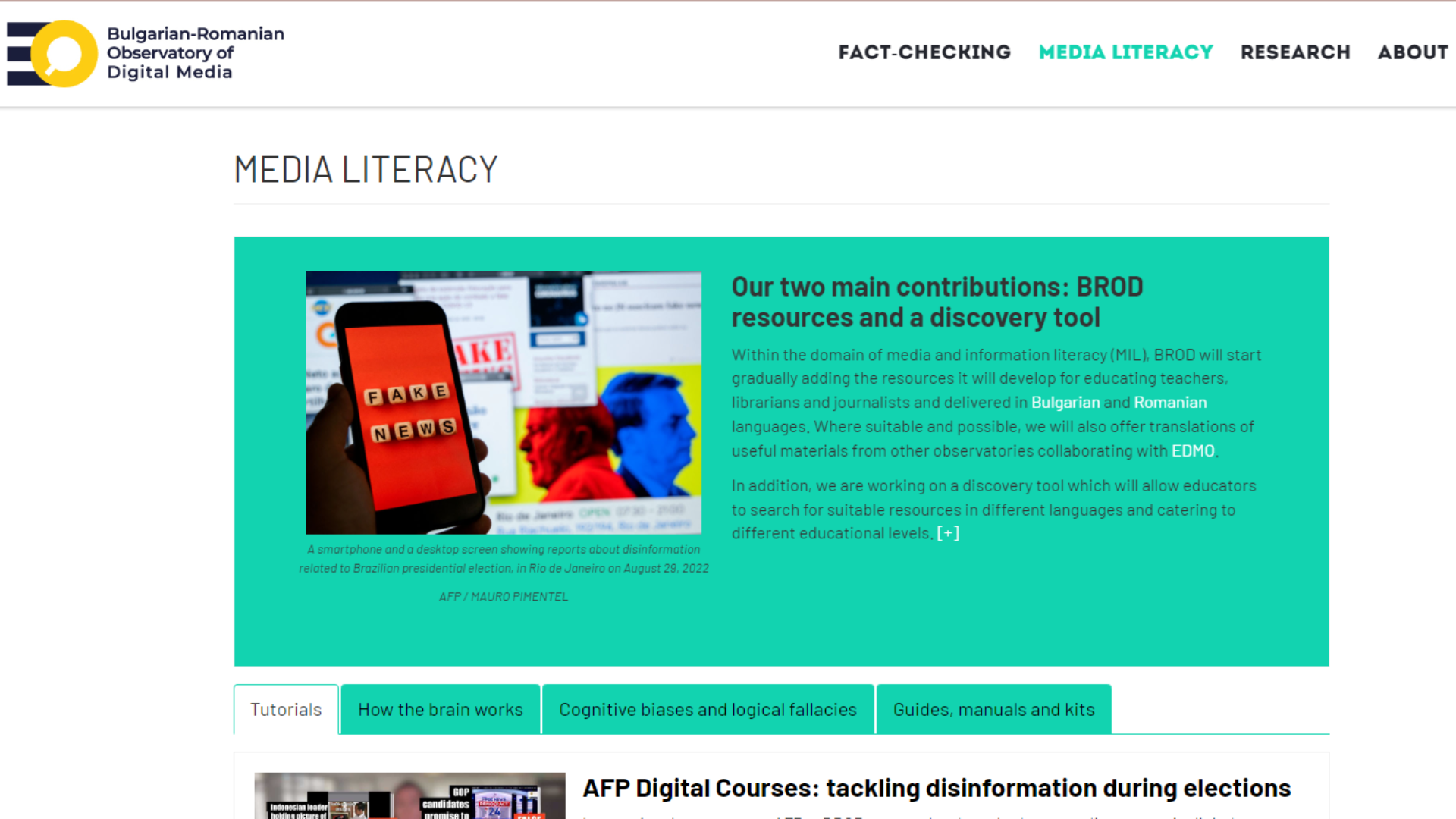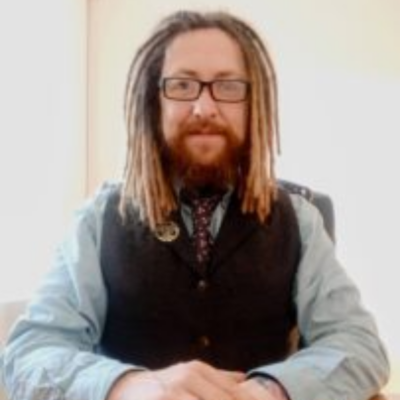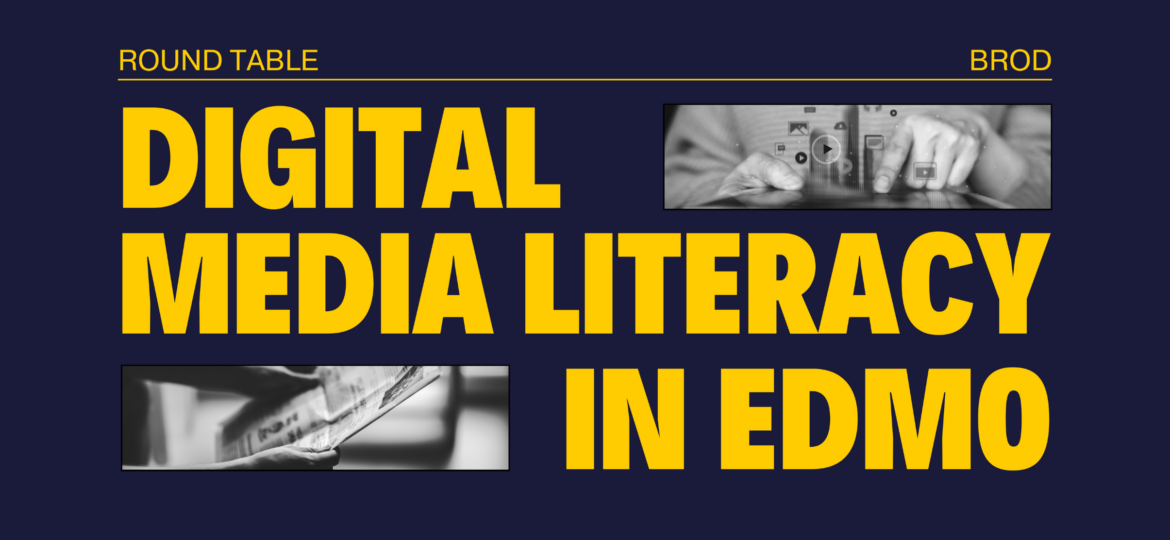Digital Media Literacy in EDMO Round Table: BROD
This interview is part of the ”Digital Media Literacy in EDMO Round Table’‘ interview series that will be published every month to highlight the work of the 14 EDMO hubs. Conducted by the Media & Learning Association (MLA).

Who are the leading players in these countries (Bulgaria and Romania) when it comes to promoting media literacy?
In Romania, several public and private groups have been involved in efforts to promote media literacy. The most prominent BROD members which are part of these are the Centrul Pentru Jurnalism Independent (Center for Independent Journalism or CJI) and Funky Citizens. Both organisations are deeply involved in efforts to organise onsite training for Romanian teachers, webinars for the general audiences, and citizen-led local actions, while also offering input to the other transnational, regional workshops, seminars or events on the topic. Funky Citizens specifically are working with younger people, migrants, and senior citizens as groups which may be particularly susceptible to dis- or misinformation campaigns. Other prominent groups working on the issue include ActiveWatch, Mediawise Society, and Asociatia Jurnalism si Comunicare (AJC). There is also a National Strategy for the Digital Agenda, which has been developed in line with the Digital Agenda for Europe. This includes several formal education-based initiatives in place which are supported by government ministries and NGOs such as Youngsters’ Safety on Internet, as well as non-formal and informal learning campaigns such as No Hate Speech.
In Bulgaria, there is no national strategy on media literacy, there is a however a provision for media literacy in the Ordinance of 2016 on civic education (media literacy was included in this ordinance in 2018). The situation means that most of the work on leading media literacy efforts currently falls to the Media Literacy Coalition, which consists of organisations across areas such as education, journalism and civic participation, academia, and media literacy. While the Coalition is not the only one, it is a networking organisation, so it is reasonable and logical to expect from it to have a leading role. More players are adding sources and resources as such Factcheck.bg, AFP fact-check, and some long-term university projects and efforts. BRODhub is a member of the coalition and continues to seek ways of expanding collaborative efforts within the coalition and with key policymaking and societal stakeholders. The NTCenter in Bulgaria is a vital strategic partner of BRODhub within these efforts and creator of unique cognitive based media literacy materials and insights.
Do you have any idea as to how media-literate people in this region are generally? Are there any types of measures that can be used to assess this over time?
The current most prevalent measure in Bulgaria & Romania is the Media Literacy Index which was launched in 2017 in response to the spread of misinformation around high-profile international issues. The index is composite and measures the potential for resilience to these dis-and misinformation campaigns along with the ability to mitigate their effects in several European countries.
The yearly reports are produced by the European Policy Initiative (EuPI) of the Open Society Institute – Sofia and ranks thirty-five countries in Europe – the 27 EU countries, the UK, Iceland, Serbia, North Macedonia, Bosnia and Herzegovina, Albania, Montenegro, and Turkey. The Balkan countries have consistently scored as more vulnerable to the negative influence of fake news and disinformation due to the impact of a variety of factors such as concentrated media ownership, deficiencies in education policies and the low levels of institutional and media trust among people. Bulgaria is the EU member-state with the worst ranking, Romania occupies the position just above Bulgaria.
In addition to the ML Index as a measurement tool, the development of media literacy programs, the media ecosystem, educational system, digital skill, and social capital in Bulgaria can be tracked in pan-European monitoring reports such as: Digital Economy and Society Index (EC), Media Pluralism Monitor, the Press Freedom Index by Reporters without Borders. There are also important insights and measures available from UNESCO.
What are the main challenges you face in promoting media literacy in these two countries?
There are overlapping issues in both countries including concentrated media ownership, the power of sensationalist content and structured propaganda campaigns by both external and internal actors, and the urgent need to address and update educational policies to prioritise critical thinking skills in order to empower citizens to discern credible information from poor quality or false information in a digital environment.
Additionally, while there are some differences in terms of the regulatory frameworks or lack thereof for each country, inadequate regulatory guidelines contribute to the challenges faced by those seeking to promote media literacy in both countries.
Bulgaria in particular is currently enduring a period of high political instability, which paralyses policymaking efforts which would seek to tackle this important issue and empowers elements within the society who can sow discord and confusion so as to capitalise politically on the lack of widespread media literacy skills amongst the public. There is a high prevalence for conspiracy theories to spread rapidly and easily and this leaves both counties vulnerable to coordinated disinformation and manipulation efforts. Both countries could perhaps be characterised most accurately as demonstrating both a lack of political will and vision on the issue. The ever-evolving political situation in both countries and across the EU creates a constantly shifting playing field, where technological innovation, politics, and disinformation campaigns clash in a storm of information chaos.
In addition, the involvement of multiple stakeholders and players in addressing these issues is often hindered by a lack of coordination and complementary approaches. Indeed, because there is currently no agreed upon standard against which media literacy interventions and campaigns can measure their impact, we cannot tell what type of interventions work best. A related issue here, is that the quality of media literacy resources and interventions is dependent on the organisational resources and competencies that are available within the organisations that put them forward. In many cases, these are small, independent players, who simply cannot afford a rigorous process of establishing the base of their work in science, organising peer reviews, and engaging in pilot-testing. Post-intervention surveys are scarce, and what we could really use is a comprehensive consensus model that can track the impact and how sustainable it is over time.
What value do you think EDMO and the network of EDMO hubs in particular bring to the challenge of fighting disinformation and promoting media literacy in Bulgaria and Romania?
For low resource countries such as Bulgaria and Romania, EDMO plays a crucial role in the fight against disinformation at the EU level. The inclusion of researchers and experts from individual countries to collaborate and share their experiences in creating media-educational programs specifically tailored to their population is of great value. These interactions not only allow for the exchange of knowledge and best practices, but also provide a platform for discussion of current challenges and potential international research and educational collaborations.
Being part of the network also helps amplify the voices of hubs from less prominent countries in the bloc to utilise EDMOs influence and weight on the EU level, enabling them to effectively lobby for the promotion of media literacy and highlight country and region-specific issues. Such a role should not be underestimated, as it plays a vital part in shaping the collective understanding and implementation of media literacy initiatives across Europe.
An immediate example of a tangible value, based on the country specific answer to the last question is the attempts by EDMO to draft and implement proposals for media literacy standards and guidelines.
What types of media literacy activities have been organised by BROD since it was set up?
- Seventy-five teachers in seventy-four schools in Romania have been trained.
- BROD member AFP conducted both in person and online training sessions for factcheckers and journalists in Bulgaria and Romania in order to help create a set of high standard practices.
- AFP uploaded training videos on BRODhub website.
- NTCenter uploaded a media literacy section in English: Tutorials, How the brain works , Cognitive biases and logical fallacies, Guides, manuals and kits
What plans do you have in relation to media literacy for the next 12 months for BROD?
BRODhub will continue to promote media literacy in Bulgaria and Romania by providing education and training programs, expanding collaborative knowledge exchanges, and sharing resources and best practices (on BRODhub website), and raising awareness. We are planning to grow our collaborative network by partnering with more educational institutions, develop unique language specific digital tools, and contribute as much as possible to the development of more resilient societies in both countries.
Training campaigns and materials
BROD targets three professional groups which either will use the skills acquired in their professional practice (media professionals) or are heavily involved in educating in formal and informal environments (teachers and librarians) – these groups have the potential to accelerate the overall level of media literacy through their activities. The second type of target groups are addressing with a priority the sections of society which are most vulnerable or in need of media literacy education (teenagers and the elderly).
Special attention will be paid to the preferred communication channels, learning style and factors specific to each country. This needs assessment will be followed by the development and delivery of a mix of long and short forms of educational materials to help build resilience to disinformation. These will combine various teaching activities and campaigns on a combination of media and communication channels.
Where possible, BROD will create localised versions of existing and effective media literacy materials produced by other EDMO hubs.
The task also includes preparation of training materials for building capacity in applying BROD established methodology and disinformation analysis workflows and using EDMO and BROD open-source platform, database and dashboard, localised content verification and text-based disinformation AI analysis tools. The training material will include interactive visual tutorials and guides, demo scenarios, examples, technical documentation on how to use the platform APIs, etc. BROD will organise and deliver training campaigns focused on two main areas: media literacy and fact-checking. BROD will organize 6 training courses on media literacy and countering disinformation for citizens, organisations, and groups from particularly vulnerable communities affected by disinformation.
In Romania, 10 courses on media literacy will involve 250 high school teachers, and 3 pilot courses will be delivered to secondary school teachers. In Bulgaria, 5 training sessions on fact-checking will be offered to librarians and 3 to teachers.
In Bulgaria, we have developed materials and courses aimed at empowering librarians to be able to guide the public toward resources and knowledge bases in Bulgarian. We also aim to create content which specifically aids high-school teachers in their efforts to pass along good media consumption and media literacy habits to students. In addition, we are working on a potential training for parents of teenagers which will allow them an active role in guiding adolescents at home in good media literacy practices and thinking. We will also look at creating webinar media literacy content which can be shared across the country in schools, libraries and amongst parents and other vulnerable members of society.
Mass media campaigns will combine television formats with online content and will be led by BNT. These campaigns will aim to support the segments of the population with specific information needs, e.g. children, elderly citizens, state/ local government officials, CSOs; ethnic minorities, activists.
The partners involved and the concrete planning are as follows: for Bulgaria – BNT, VR and NT Center will organize three training sessions and awareness campaigns at different times in the coming period. These training sessions will involve representatives of local partners as well as journalists and fact checkers. The delivery of 3 training sessions at different times allows for an expansion of the reach of the capacity building; for Romania: SNSPA, Funky citizens and CJI will deliver training sessions at different times in the coming 18 months.
BROD will also organize events to raise awareness and promote media literacy: one each in Romania and Bulgaria. We estimate that the digital campaign on media literacy will reach at least 300,000 people in the region and that the events will be attended by 200-250 people in total.
XWiki, as the portal operator, will also create an easy-to-use form on the portal, where citizens can submit examples of disinformation that they encounter on public and private social media and messaging apps.

